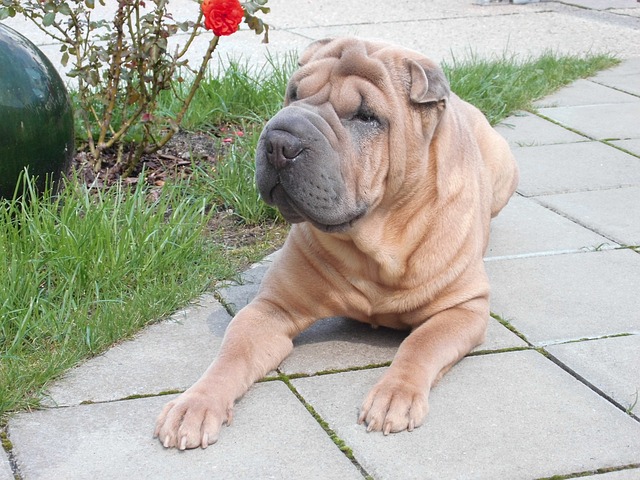


The Chinese Shar-Pei is a unique and distinctive dog breed, known for its wrinkled skin, "hippopotamus" face, and blue-black tongue. Originally bred in China for hunting and guarding, this breed is calm, independent, and often described as having a cat-like personality. Despite its appearance, the Shar-Pei is a loyal and loving companion, known for forming strong bonds with its family. It is a relatively low-maintenance dog in terms of exercise but requires good socialization and early training to thrive as a family pet.
The Chinese Shar-Pei has an ancient history that dates back over 2,000 years to the southern regions of China. It was originally bred as a hunting dog and used for guarding livestock and property. The breed's distinct wrinkled skin and "hippopotamus" face were developed to help protect it during encounters with large, aggressive game. In China, the Shar-Pei was also used as a fighting dog in ancient times, but by the mid-20th century, it became nearly extinct due to political upheaval and changing societal needs. However, the breed was revived in the 1970s, and its popularity grew worldwide, particularly after being introduced to the United States. Today, the Chinese Shar-Pei is a beloved companion dog and a popular breed in many countries.
The Chinese Shar-Pei is a medium-sized breed, typically standing between 18 to 20 inches (46 to 51 cm) at the shoulder and weighing between 45 to 60 pounds (20 to 27 kg). Its most distinctive feature is its loose, wrinkled skin, especially around the face and neck. The breed has a broad, square head, a small, compact body, and a short, bristly coat that can come in a variety of colors, including fawn, red, black, and blue. One of the most iconic traits of the Shar-Pei is its blue-black tongue, which is also seen in some other Chinese breeds. The Shar-Pei's ears are small, rounded, and held close to the head. Its tail is thick and curled over the back, adding to the breed's unique appearance. The coat of the Chinese Shar-Pei is bristly, short, and feels almost like sandpaper to the touch.
The Chinese Shar-Pei is known for its independent and sometimes aloof personality, but it is also affectionate and loyal to its family. This breed tends to be reserved around strangers, making it an effective watchdog. Despite its somewhat stoic demeanor, the Shar-Pei forms close bonds with its human companions and is particularly devoted to its family. It is often described as having a cat-like personality, as it is low-key, quiet, and enjoys its alone time. The Shar-Pei can be playful but is not overly energetic, making it a good choice for people who prefer a calm dog. Early socialization is important to prevent the Shar-Pei from becoming too territorial or protective, and it should be introduced to a variety of people, animals, and situations from a young age.
The Chinese Shar-Pei is a relatively low-energy dog that does not require extensive exercise. However, it still benefits from daily walks to stay fit and healthy. Due to its independent nature, the Shar-Pei may not be as eager to engage in strenuous play or exercise as some other breeds, but it will enjoy leisurely walks and moderate activity. It is important not to overexert the Shar-Pei, especially in hot weather, as the breed is prone to overheating due to its short coat and wrinkled skin. Regular mental stimulation, such as interactive toys or training sessions, can help keep the Shar-Pei content, as it is an intelligent dog that enjoys learning. While the breed is not particularly high-energy, it should still be provided with a good balance of physical and mental exercise to maintain its overall well-being.
The Chinese Shar-Pei is an intelligent breed, but it can also be stubborn and independent. Training should be approached with patience and consistency, using positive reinforcement techniques like treats, praise, and playtime. This breed does not respond well to harsh training methods and may become defiant or aloof if treated too harshly. Early socialization is important to help the Shar-Pei develop a well-rounded temperament and prevent it from becoming overly territorial or aggressive toward strangers and other pets. The Shar-Pei may also benefit from obedience classes, especially if it exhibits independent or headstrong behavior. While the breed is naturally reserved, proper socialization can help it feel more comfortable in a variety of environments and with different people and animals.
The Chinese Shar-Pei is generally a healthy breed, but like all dogs, it is susceptible to certain health conditions. Some common health concerns include hip dysplasia, entropion (a condition where the eyelids roll inward), skin infections (due to its wrinkles), and respiratory issues, particularly in hot or humid weather. It is important to clean the folds of the Shar-Pei's skin regularly to prevent moisture buildup and infections. The breed's short coat requires minimal grooming, but the skin folds should be kept dry and clean to avoid irritation. Regular veterinary check-ups and a healthy diet are essential for maintaining the breed's overall health. Due to their compact build and short muzzle, Shar-Peis can be prone to breathing issues, so care should be taken in hot or humid climates to avoid overheating.
The Chinese Shar-Pei has an average lifespan of 8 to 12 years. Like many breeds, its lifespan can be influenced by factors such as genetics, diet, exercise, and overall health care. With proper care, including regular vet visits, a balanced diet, and appropriate exercise, the Shar-Pei can live a long and healthy life. It is also important to monitor the breed for any signs of common health issues, such as skin problems or eye conditions, and address them promptly with veterinary care.
© copyright Dog Compendium 2024 - 2026